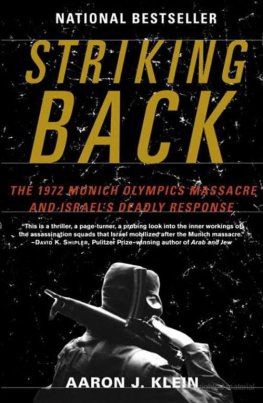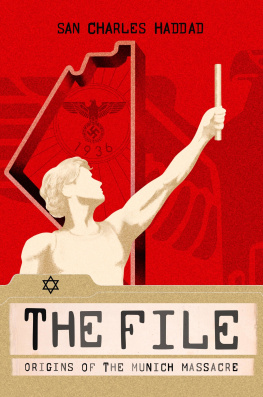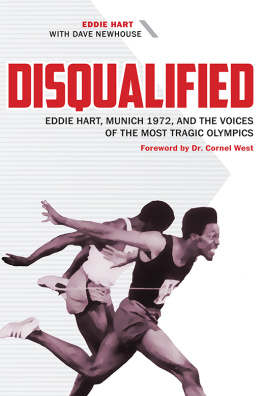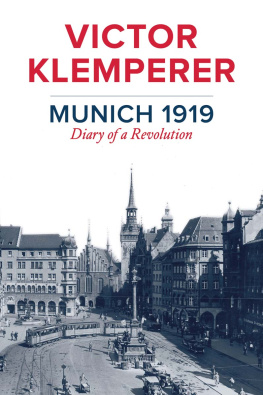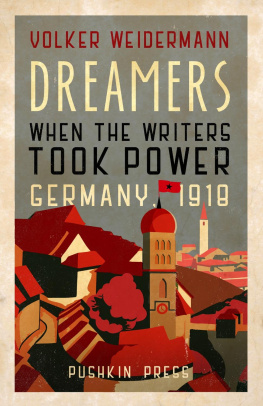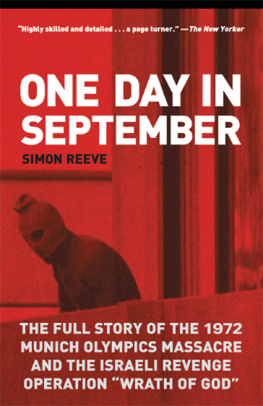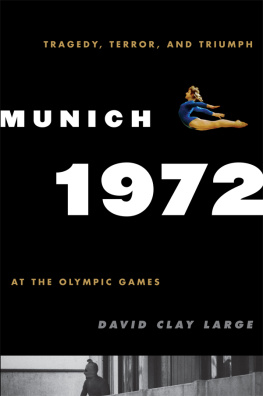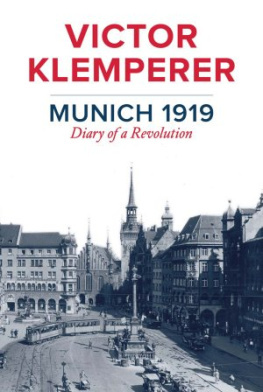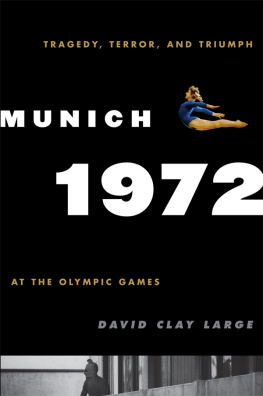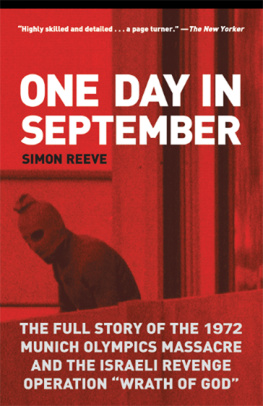The 1972 Munich Olympics and the
Making of Modern Germany
WEIMAR AND NOW: GERMAN CULTURAL CRITICISM
Edward Dimendberg, Martin Jay, and Anton Kaes, General Editors
The 1972 Munich
Olympics and the
Making of Modern
Germany

Kay Schiller and
Christopher Young

University of California Press, one of the most distinguished university presses in the United States, enriches lives around the world by advancing scholarship in the humanities, social sciences, and natural sciences. Its activities are supported by the UC Press Foundation and by philanthropic contributions from individuals and institutions. For more information, visit www.ucpress.edu.
University of California Press
Berkeley and Los Angeles, California
University of California Press, Ltd.
London, England
2010 by The Regents of the University of California
Library of Congress Cataloging-in-Publication Data
Schiller, Kay.
The 1972 Munich Olympics and the making of modern Germany / Kay Schiller and Christopher Young.
p. cm.
Includes bibliographical references and index.
ISBN 978-0-520-26213-3 (cloth : alk. paper)
ISBN 978-0-520-26215-7 (pbk. : alk. paper)
1. Olympic Games (20th : 1972 : Munich, Germany)History. 2. TerrorismGermanyMunich. 3. AthletesViolence againstGermanyMunich. 4. GermanyPolitics and government20th century. I. Young, Christopher, 1967II. Title.
GV7221972.S35 2010
796.48dc22 2010004934
Manufactured in the United States of America
19 18 17 16 15 14 13 12 11 10
10 9 8 7 6 5 4 3 2 1
This book is printed on Cascades Enviro 100, a 100% postconsumer waste, recycled, de-inked fiber. FSC recycled certified and processed chlorine free. It is acid free, Ecologo certified, and manufactured by BioGas energy.
This book is dedicated to Hans Schiller, who took me as a young boy
to see Klaus Wolfermann win the javelin gold in 1972
(Kay Schiller)
In loving memory to Valerie Young, who first told me about Mark
Spitz and spent many years patiently waiting for me to emerge
from sports matches
(Christopher Young)
CONTENTS
ILLUSTRATIONS
ACKNOWLEDGMENTS
During the course of conceiving, researching, and writing this book, we have incurred many debts and it is a pleasure to acknowledge them here. It is not possible to record the nature of every assistance offered, but it is true to say that every single person mentioned in the following list combined the giving of their expertise and knowledge with spontaneous acts of generosity and hospitality that added greatly to the enjoyment and fulfillment of completing this project. The brevity with which they are mentioned stands in inverse proportion to the gratitude we owe them and the warmth with which they are all remembered now.
Paul Betts, Erik Eggers, Markus Hesselmann, Manfred Lmmer, Andrei Markovits, Rudolf Spindler, and Alan Tomlinson were there from the beginning, and without their encouragement and support, this work would hardly have stumbled out of the starting blocks. It was funded by the Alexander von Humboldt Foundation, the British Academy, the Arts and Humanities Research Council, the Tiarks Fund in the Department of German and Dutch, and the Fellows Research Fund, Pembroke College, University of Cambridge, and the Research Funds of the History Department and the Faculty of Arts and Humanities of Durham University.
Colleagues at the Deutsche Sporthochschule and the University of Cologne made every effort to facilitate research: Carl Lennartz, Walter Borgers, Evelyn Mertin, Heike Kuhn, Sandra Esser, Robin Streppelhoff, Susanne Couturier, Wolfgang Steidlinger, Walter Pape, Ursula Peters, Bernd Bastert, Timo Reuvekamp-Felber, Hans-Joachim Ziegeler, Lorenz Deutsch, Douglas Taylor. In an act of unprecedented magnanimity, Lorenz Peiffer included us in his project on GDR sport as well as welcomed us into his family. Many others helped magnificently along the way: Christiane Eisenberg, Klaus von Lindeiner, Gertrude Krombholz, Werner Rabe, Brigitte Maibohm, Manfred Grape, Lorenz Marold, Robert Ide, Heinz Florian Oertel, Winfried Nerdinger, Jrgen Wolf, Jutta Braun, Gunter Gebauer, Wolfram Pyta, Hubertus Knabe, Bob Edelman, Wayne Wilson, Ed Derse, Barbara Keys, John Efron, Kerwin Klein, Liz Leckie Schlssel, John MacAloon, Richard Holt, Peter Taylor, Saul Kelly, Jo Whaley, Niklaus Largier, Giselher Spitzer, Dan Alon, Richard Bessel, Chris Brooks, Graham Ford, Mary Fulbrook, Michael Geyer, Neil Gregor, Heinrich Jaeger, Norbert Jaeschke, Gerhild Knopf, Howell Harris, Philip Williamson, Carsten Schiller, Tobias Heyl, Lorens Holm, Hans Holzhaider, Manfred Oldenburg, Heinz Koderer, Ferdinand Kramer, Eckard Michels, Winfried Mller, Ingrid and Rolf Muth, Mike Froggatt, Peter Ramsauer, Gavriel Rosenfeld, Mark Roseman, Michael Schaich, Georg Schnfeld, Rudolf Sottung, Kathrin Stadler. Among the many interviews given, we particularly thank Friedhelm Brebeck, Rolf Mller, Dr. Hans-Jochen Vogel, Werner and Anita Ruhnau, Carlo Weber, and the late Markus Wolf.
Archivists in several countries were unstinting in their help: Albert Knoll (KZ-Gedenksttte Dachau), Peter Franz and Annegret Neupert (Bundesarchiv Koblenz), Anton Lffelmeier and Ulrike Trummer (Stadtarchiv Munich), Gerhard Frmetz and Caroline Gigl (Bayerisches Hauptstaatsarchiv Munich), Dagmar Rinker (HfG-Archiv Ulm), Claus Brgmann (Archiv fr Christlich-Soziale Politik Munich), Gisela Krause (Archiv der Friedrich-Ebert-Stiftung, Bonn), Ruth Beck-Perrenaud (IOC Lausanne), Dr. Freifrau von Boeselager (Politisches Archiv des Auswrtigen Amts, Berlin), Andreas Hfer (Deutsche Olympische Akademie), Wayne Wilson, Shirley Ito, and Michael Salmon (LA84 Foundation), and the helpful staff at the Monacensia library in Munich.
In addition to the extremely helpful readers for the University of California Press, friends, students, colleagues, and, in one case, an inspiring teacher from high school read full drafts of the manuscript with a patient and exacting eye: Lukas Werner, Heike Sahm, Klaus Nippert, Christoph Bertling, Allen Guttmann, John Knox, Barbara Koenczoel, Dieter Schulze-Marmeling, Markus Hesselmann. The usual caveat about residual errors applies. Sarah Bowden provided an outstandingly accurate and efficient first draft of the English translations of German quotations. Sharon Nevill managed the printing of multiple versions with characteristic good humor.
We were fortunate to be able to draw on excellent feedback offered at conferences and after invited lectures at the following universities: Leeds (Stuart Taberner), Birmingham (Association of Modern German Studies), Brighton (Alan Tomlinson), Glasgow (Alana Vincent), Lancaster (Student History Society), London, Institute of Historical Research (German History Seminar), Michigan (Andrei Markovits), Virginia, Charlottesville (Alon Confino), UC Berkeley (Anton Kaes, Niklaus Largier), UC San Diego (Bob Edelman, Wayne Wilson), Johns Hopkins (Stephen G. Nichols), Illinois, Urbana-Champaign (C.L. Cole), Applied Arts Vienna (Roman Horak), Liverpool (Andrew Plowman), as well as the German Historical Institute Washington (Uta Balbier, Stefan Wiederkehr).
It is an honor to appear in the series Weimar Culture and Now, and we thank the editors Anton Kaes, Martin Jay, and, in particular, Ed Dimendberg who encouraged submission to the Press when this project was barely a twinkle in the eye and saw it through to contract with consummate professionalism. The same goes for Niels Hooper, Nick Arrivo, Suzanne Knott, and Christopher Pitts at the Press, who nursed the book through to completion.
Next page

